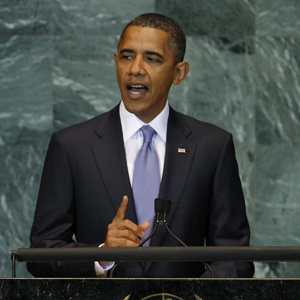Obama at the U.N.

Obama touched upon the question of world economy as the U.S., in his words, has joined with nations around the world to spur growth. He referred to international economic coordination, through the G20, and claimed that the U.S. is exploring ways to expand trade and commerce among nations. But, he failed to mention that the U.S. is spearheading and coordinating international efforts to limit trade with certain countries. The extra-territorial application of domestic laws against companies doing business with some countries is not only against the promotion of world trade and commerce, but also deprives the peoples all over the world to walk along the path of progress and prosperity.
The U.S. President talked about the removal of nearly 100,000 troops from Iraq while keeping the commitment to withdraw the rest of their troops from that country by the end of 2011. While the American decision to withdraw forces from Iraq is a welcome move, the continued U.S. attempt to interfere in the political decision-making process in Iraq is troublesome. On Afghanistan, he emphasized on NATO’s determination to defeat Taliban and al-Qaida. However, he did not say why the NATO forces are killing innocent Afghan and Pakistani civilians in the fight against al-Qaida. He also made no reference to NATO’s desire to work with certain segments of Taliban, contrary to their claim of fighting Taliban.
Obama included a large segment of his speech to the current negotiation between Israelis and Palestinians. He tried to take a balanced position regarding the Arab-Israeli conflict, but in reality he failed to do so and thus once more exposed the U.S. position as an honest broker. He expressed his opposition to the killings of Israelis, but he was silent about the slaughter, by Israel, of innocent Palestinians and those Turkish citizens, on board a ship, who were trying to help the people of Gaza. He also was silent on the illegal blockade of Gaza. Obama was clear on the need to extend the moratorium on the settlements. Now, after the Israeli decision to continue with the settlements, we have not heard any opposition to this illegal Israeli practice by the U.S. Administration. This is a test for the U.S. The opposition to the lifting of moratorium should be followed by action.
On Iran, he repeated the U.S. position on the Iranian nuclear file and tried to depict a picture of his administration that has extended a hand of friendship to Iran only to be rejected. This is far from the truth. The fact of the matter is that after becoming president, Obama changed the tone of the U.S. government towards Iran. However, no actual change appeared in the American policy towards Iran. Besides continuing with the unilateral sanctions against Iran, the U.S. Congress allocated a budget to undermine the Islamic Republic. Furthermore, while Obama was using a different language about Iran; his administration was working very hard to garner support for the new sets of sanctions against Iran at the U.N. and through individual countries.
As a party to the Non-Proliferation Treaty (NPT), Iran is entitled to peaceful use of nuclear technology. Iranian officials have announced, time and again, that they are interested to sit down and talk about this issue but they cannot accept to negotiate under any threat. The best thing to do for Iran and the United States is to start negotiations, within the framework of 5+1, without any precondition. It is of paramount importance for all that during the period of negotiations neither side should resort to coercive diplomacy or diplomacy of threats.
All in all, the Obama’s speech at the U.N. did not surprise many observers. This was his second address at the U.N. One can say that the passage of time has taught Obama not to deviate from the classical U.S. positions on international issues, especially in an election year. During the presidential campaign, Obama reiterated much on the need to change the domestic and foreign policies of the United States. Although one cannot deny that the present U.S. government is emphasizing more on multilateralism than its predecessor, but the fact of the matter is that Obama has learnt that it is not easy to match his deeds with his words. However, he should take into consideration that in the eyes of the people across the globe, including in America, he is beginning to loose his credibility and image.

